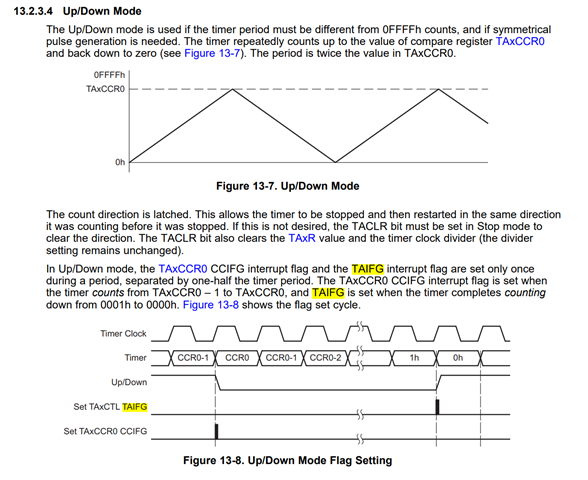Hello!
I am working with a MSP430FR2476 in LPM3.5 and waking up with RTC. Once the micro is up from LPM3.5 I to use Timer A0 in UP-DOWN mode to have a timeout inside a function so that I can get out in case I take too long, but I am not getting inside the TIMER0_A1_ISR.
I haven't seen any examples where a timer is used as a timer (not for waking up from LPM3.5) alongside RTC for waking up from LPM3.5.
I wanted to know if i am missing some configuration on the RTC side or the LPM3.5 side.
When I was using LPM4 and a port interruption to wake up from LPM4 mode the timer A timeout was working fine.
I am using the driver libraries RTC.h and timer_a.h from the SDK from MSP430FR2476
This is my RTC initialization:
void initRTC(bool irqEnable,bool minsOrSec, uint16_t t)
{
WDTCTL = WDTPW | WDTHOLD; // Stop watchdog timer
uint16_t modulo;
uint32_t mod;
if(minsOrSec)
{
mod = t * 32 * 60; // Dado que al hacer 32 * t_tick = 1s * 60 = 1m
}
else
{
mod = t * 32;
}
//Testing
//modulo = 32; //-->IRQs cada 1seg
modulo = 57600; // --> IRQs cada 30mins
if(mod < modulo)
{
modulo = (uint16_t)mod;
}
else
{
cantIRQs = (uint16_t)(mod/modulo); // A priori nos va a dar un numero entero. (seconds = 21600 --> 6h)
}
*(unsigned int*)(BKMEM_BASE) = (unsigned int)cantIRQs;
*(unsigned int*)(BKMEM_BASE+2) = (unsigned int)countIRQs;
P2SEL0 |= BIT0 | BIT1; // set XT1 pin as second function
do
{
CSCTL7 &= ~(XT1OFFG | DCOFFG); // Clear XT1 and DCO fault flag
SFRIFG1 &= ~OFIFG;
} while (SFRIFG1 & OFIFG); // Test oscillator fault flag
// Initialize RTC
// Source = 32kHz crystal, divided by 1024
RTC_clearInterrupt(RTC_BASE,RTC_OVERFLOW_INTERRUPT_FLAG);
__bis_SR_register(GIE); //Enable interrupts
RTC_init(RTC_BASE, modulo - 1, RTC_CLOCKPREDIVIDER_1024);
RTC_enableInterrupt(RTC_BASE, RTC_OVERFLOW_INTERRUPT);
RTC_clearInterrupt(RTC_BASE,RTC_OVERFLOW_INTERRUPT_FLAG);
RTC_start(RTC_BASE,RTC_CLOCKSOURCE_XT1CLK);//RTC_CLOCKSOURCE_XT1VLOCLK
}
This is how I enter LPM3.5 mode
PMMCTL0_H = PMMPW_H; // Open PMM Registers for write
PMMCTL0_L |= PMMREGOFF; // and set PMMREGOFF
__bis_SR_register(LPM3_bits | GIE); // Enter LPM3.5 and Enable Interruptions
This is how i init the timer A instance 0
//Initialize Timer0_A3 --> Up-Down Mode
Timer_A_initUpDownModeParam upDownCtr;
upDownCtr.clockSource = TIMER_A_CLOCKSOURCE_ACLK;
upDownCtr.clockSourceDivider = TIMER_A_CLOCKSOURCE_DIVIDER_1;
upDownCtr.timerPeriod = 65535; //From 0h to 0FFFFh --> ~ 4 seg (updown)
upDownCtr.timerInterruptEnable_TAIE = TIMER_A_TAIE_INTERRUPT_ENABLE;
upDownCtr.captureCompareInterruptEnable_CCR0_CCIE = TIMER_A_CCIE_CCR0_INTERRUPT_DISABLE;
upDownCtr.timerClear = TIMER_A_DO_CLEAR;
upDownCtr.startTimer = false;
Timer_A_initUpDownMode(TIMER_A0_BASE ,&upDownCtr);
When waking up from RTC I run the initialization of everything i needed again and then I start the timer A with Timer_A_startCounter(TIMER_A0_BASE,TIMER_A_UPDOWN_MODE); but I never reached the timer interruption:
// Timer0_A3 CC1-2, TA Interrupt Handler
#if defined(__TI_COMPILER_VERSION__) || defined(__IAR_SYSTEMS_ICC__)
#pragma vector = TIMER0_A1_VECTOR
__interrupt void TIMER0_A1_ISR(void)
#elif defined(__GNUC__)
void __attribute__ ((interrupt(TIMER0_A1_VECTOR))) TIMER0_A1_ISR (void)
#else
#error Compiler not supported!
#endif
{
switch(__even_in_range(TA0IV,TA0IV_TAIFG))
{
case TA0IV_NONE: // No interrupt
break;
case TA0IV_TACCR1: // CCR1 not used
break;
case TA0IV_TACCR2: // CCR2 not used
break;
case TA0IV_TAIFG: // overflow
counterTimer--;
if(counterTimer <= 0)
{
timeOut = true;
}
break;
default:
break;
}
}
Also, the Code Composer Studio compiler does not allow me to place a breakpoint inside the interruption (line 23), therefore I assume there is a problem with the configuration of the LPM3.5 mode or the RTC mode.
Just in case I will include the code form the RTC interrupt vector:
// RTC interrupt service routine
#if defined(__TI_COMPILER_VERSION__) || defined(__IAR_SYSTEMS_ICC__)
#pragma vector=RTC_VECTOR
__interrupt void RTC_ISR(void)
#elif defined(__GNUC__)
void __attribute__ ((interrupt(RTC_VECTOR))) RTC_ISR (void)
#else
#error Compiler not supported!
#endif
{
cantIRQs = *(unsigned int*)BKMEM_BASE;
countIRQs = *(unsigned int*)(BKMEM_BASE+2) + 1;
switch(__even_in_range(RTCIV,RTCIV_RTCIF))
{
case RTCIV_NONE: break; // No interrupt
case RTCIV_RTCIF: // RTC Overflow
{
RTC_clearInterrupt(RTC_BASE,RTC_OVERFLOW_INTERRUPT_FLAG);
if(countIRQs == cantIRQs)
{
cbStatus = true;
countIRQs=0;
}
else
{
cbStatus = false;
}
*(unsigned int*)(BKMEM_BASE+2) = 0;
*(unsigned int*)(BKMEM_BASE+2) = countIRQs;
}
break;
default: break;
}
}
Thank you and any tip or example where LPM3.5 + RTC to wake up + Timers are used will be greatly appreciated.


